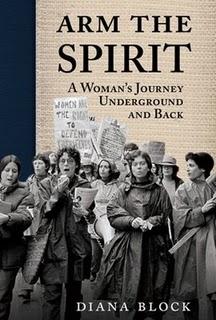Arm the Spirit: A Woman’s Journey Underground and Back

Upon finishing the initial chapters of the memoir Arm the Spirit, I was caught off guard by how different the experiences of Diana Block were from my own. Written from her memories of participating in revolutionary movements and subsequently shifting to life underground, Block’s stories did not reflect the political landscape that I am familiar with today. Her descriptions of fleeing the FBI and assuming new identities like changes in clothing brought to mind Giaconda Belli’s writings about the Sandinistas in Nicaragua more so than contemporary American feminist writers. But as I dove farther into the book, Block slowly bridged the gap between her political experiences and my understanding of political activism.
Throughout the course of the book Block artfully maps out the shifting political landscape over the course of several decades, infusing political theory with her lived experience as a mother, wife, activist and woman. Her narrative is saturated with historical information, and her memories forced me to come to terms with the fact that perhaps I am not living in what I would like to imagine as the “land of the free.”
Beginning with her initial experiences with radical organizing as a young woman fresh out of college, and expanding slowly into her participation in the Weather Underground, Block allows the reader a window into the revolutionary struggles that are mythologized today. Block weaves in her experience as woman, including her critiques and personal experiences, in a way that makes the political real; this blurring between the personal and the political is precisely what makes Block’s memoir so powerful.
Throughout most of the book Block recalls her experiences living underground with several other political allies, a move she made after discovering a bug placed in her vehicle by the FBI. Her association with anti-colonial revolutionary groups made her a target and, as a result, her life and the life of her baby son were irrevocably changed. Hyper-aware of how vulnerable their visibility was, Block and her partner (who was also living underground) were required to play heteronormative house in order to ensure their invisibility, an emotionally burdensome task that Block conveys through poetry interspersed in her narrative. Despite the difficulties that Block faced in life underground, her descriptions of the political prisoners suffering painful interrogations and long sentences with no access to family or loved ones, remind us of what she escaped through living underground. In fact, perhaps the initial shock I experienced when reading Arm the Spirit was not because Block’s narrative did not resonate with my life, but because it was difficult to accept that I was living in the same country that Block described. The thought of living in a nation that not only internally incarcerates people (men of color disproportionately so) at a ghastly rate, but one that is actively engaged in a war that serves neo-colonial purposes is a paralyzing realization.
Arm the Spirit serves to remind us of the political realities that we are faced with and of the dangers of apathy. Block’s narrative paints a picture of a world filled with suffering, but conversely one in which people are motivated to change the course of things. This narrative presents us with an empowering vision of the past that can hopefully resonate with the political and the personal landscape today.